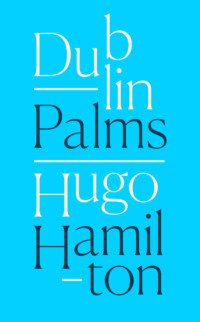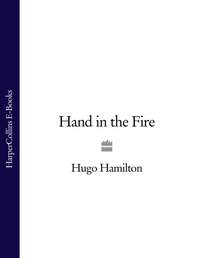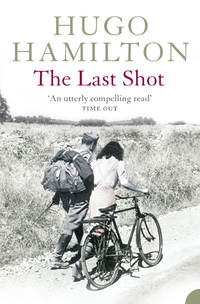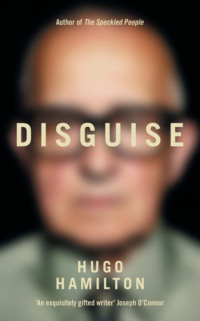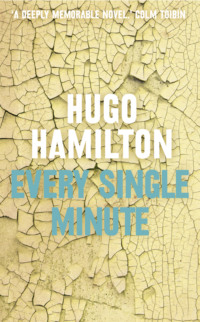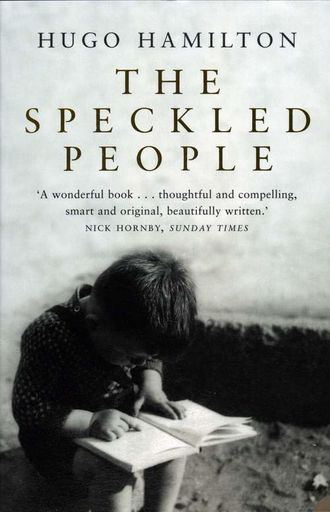
Полная версия
The Speckled People
‘Who gave you the right to look at my things?’ he said, because he didn’t want any of us to know that he had a father in the navy who could not speak Irish and once stood with the British in a war against the Germans, when his own country was still not free.
Maria was huddled in my mother’s arms, crying even more after she was rescued than before when she was trapped. She said Franz was the driver and I was the conductor and she was only a passenger, like the sailor in the back seat. My father’s voice filled the room and I felt the sting of his hand, but it was nothing because soon we were all safe again and my mother was talking about the cake for after dinner. The medals were taken off and put away. The picture of the sailor with the soft eyes disappeared and we never saw him again after that. Nobody mentioned him. I had no way of keeping him in my head because he was gone, back into the wardrobe where nobody could rescue him. We didn’t know how to remember him, and like him, we lost our memory.
Three
My mother’s name is Irmgard and she was in a big film once with lots of war and killing and trains on fire. It’s a black and white picture that happened long ago in Germany. A man trapped her in a place called Venlo where she was working and she couldn’t escape. She says it was just like us being in the wardrobe because she was far away from home and couldn’t call for help. She couldn’t write home or tell any of her sisters what was happening. She didn’t know who to talk to. The man’s name was Stiegler and he would not listen to her when she spoke to him and would not let her go. Instead he told her to smile. And even though she was too afraid to smile, he just put his hand up to her lips and made her show her teeth like a big unhappy grin. She can’t talk about it any more than that. She has told nobody else, not even her sisters, not even my father. One day, when we get older we’ll hear the whole story. But now we’re too small, and some things about Germany are not good to think about. ‘That’s a film you can see when you grow up,’ she says.
All we need to know is that at the end of the film, when the war is over, my mother runs away to Ireland to go on a pilgrimage. She meets my father in Dublin and they talk about everything except the time she was trapped once by the man in Venlo. They go back to Germany to get married with the snow all around. They travel through the white landscape and go to a mountain along the River Rhine called the Drachenfelz, and after that my father brings her back to Ireland to another mountain close to the Atlantic called Croagh Patrick.
‘And that’s how the film ends,’ she says, because it’s time to sleep and she doesn’t want us to keep calling her and asking more questions about Germany that she can’t answer. ‘The End. Film over.’ She says the same thing sometimes when we start fighting over the leftovers of the cake bowl. Or the time we went to the strand and stayed there all day until it started raining and she said it was a pity it had to end like that. Or when something breaks, like the time the blue vase that came from her father and mother’s house in Kempen smashed in the hallway and she said it was a very nice film but now it was over.
In my mother’s film, she was in a building where there was nobody else living. At night when everybody was gone, she was afraid and locked the door of her room. She knew that there was no point in shouting for help, because nobody would hear her. Then she heard the man coming in and there was nothing she could do except pray and hope that it would be all over some day. She could hear him coming up the stairs as if he was counting them on the way up. She could hear him breathing outside the door. She could see the doorknob turning and she could smell cognac.
During the day, the man was always very nice to everybody. He looked very well, dressed in a suit and a clean shirt every morning, and he wore good shoes. He spoke kindly and shook hands with everyone when they arrived to work. He smiled and even remembered everybody’s birthday. He brought flowers to work when somebody had bad news. Everybody said he was a good man during the day and full of compliments. He had read a lot of books and he was very generous, giving presents of theatre tickets and opera tickets.
But you can’t always trust nice people. My mother says that sometimes there is no defence against kindness. It’s easy to be taken in by compliments, by smiles, by nice words. But you can’t let yourself be stung by things like flowers and theatre tickets and invitations to the opera. Everybody can make mistakes but there are some mistakes you can’t even talk about, because you feel so stupid that you can only blame yourself. My mother wants us never to be fooled by nice words. She wants us never to have things that we regret, because everybody in Germany has things in their heads that they keep to themselves. Everybody has things they wish had never happened.
When you’re small you can inherit a secret without even knowing what it is. You can be trapped in the same film as your mother, because certain things are passed on to you that you’re not even aware of, not just a smile or a voice, but unspoken things, too, that you can’t understand until later when you grow up. Maybe it’s there in my eyes for all to see, the same as it is in my mother’s eyes. Maybe it’s hidden in my voice, or in the shape of my hands. Maybe it’s something you carry with you like a precious object you’re told not to lose.
‘That film will still be running when we grow up,’ she says.
All we need to know for now is that she ran away to Ireland to become a pilgrim in a holy country with priests and donkeys that had crosses on their backs. She picked Ireland because she heard there were lots of monastic ruins. She didn’t expect so much poverty. But the Irish people knew how to deal with poverty, through celebration, with smoke and stories and singing. A man with a packet of cigarettes was a millionaire in Ireland. And the Irish people had never tried to hurt anyone. So maybe they would not pass judgement on a German woman. In the days before she left Germany, it was so exciting, she says, because nobody in her family had ever been that far away before. Everybody was talking about Ireland, even the neighbours, asking what the weather was like and what the houses were like inside. What she should bring and what she didn’t need. She said she packed and unpacked all over again so often that it was hard to believe she was going away at all in the end.
At the station, she embraced her aunt Ta Maria and her Onkel Gerd and her youngest sister Minne, but it was hard to feel she was leaving. They all had tears in their eyes and would not let her get on the train because they thought she would never come back. They made her promise to write home every week. Even when she was sitting down in her seat, even when the train carriages jerked and the train moved out of the station, it was still hard to feel anything except fear. Everybody in Germany was used to being afraid. She waved her hand slowly. She saw the houses and the fences and the fields passing by, but she still had the feeling that she was trapped. But then, my mother says, there comes a moment when you don’t care about anything, when all fear and doubt disappear. It’s a moment of weakness and strength at the same time, when nothing matters and you’re not afraid any more.
Sometimes she still thinks about it as though it just happened yesterday, as though the film is never over and she’ll never escape. Maybe the reason why people are good at stories is that they sometimes have things they can’t tell, things they must keep secret at all costs and make up for in other ways. So she tells us the story of the pilgrimage instead. She tells us how Ireland was a place where you could trust everyone, where people prayed every day, where you could go and say the rosary and make up for all the things that happened in the war.
It was a great way for a film to come to an end, cycling along the small roads with the sun slanting through the clouds like in holy pictures, lighting up the mountains like a stage in the opera house. It was flickering through the stone walls. Everywhere these stone walls and everywhere the grass combed in one direction by the wind. Trees bent like old men and everywhere so empty except for the haystacks in the fields and the monastic ruins. Once or twice along the way there were cows on the road that made her stop completely. Big cow faces looking at her, as if they were amazed to see a German woman in Ireland after the war.
Then it started raining and getting dark and she had to find a place to stay quickly. It was raining so much that the water was jumping away from her eyes when she blinked and her shoulders were shivering. She got off the bicycle because it was impossible to go any further. A man pointed to a house that didn’t even look like a guest house, but it was better to stay there because you couldn’t see a thing any more. There was a light on inside and the woman of the house came to the door with lots of children behind her. One girl had her dress in her mouth, all of them staring as if my mother had come in with the rain.
‘It’s not often we see a German woman cycling around these parts on her own,’ the woman said.
My mother says you can’t be sure in Ireland if people say things with admiration or not. Irish people are good at saying things in between admiration and accusation, between envy and disdain. She says the woman looked her up and down as if she liked German clothes but didn’t completely trust her.
‘I have come from Lough Derg,’ my mother explained.
That made everything right. She was a pilgrim. A pilgrim coming to Ireland to pray for all the bad things that happened in Europe.
In the kitchen, they made her sit and eat a meal while they all watched and the man of the house kept asking questions about Germany. Was it in ruins like they said in the papers? She had to describe the cities after the war – Nuremberg, Hamburg, Dresden. The woman of the house kept saying ‘You’re not serious’, but people in Germany wouldn’t make up something like that. The children kept staring. They were so shy that they were afraid to move closer to her. It was like being a film actress. They spoke about her as if she was still in a film. She’ll have some more bread, the man of the house said. She’ll be needing a glass of whiskey, he said after she was finished eating, as if they had to celebrate the guest who came in with the rain.
The man of the house raised his glass with all the children looking up.
‘Heil Hitler,’ he said.
There was a big smile on his face, my mother says, and she didn’t know what to say. Of course, he was only being friendly. It was part of the Irish welcome.
‘Fair play to the Germans,’ he said.
He said the Germans were great people altogether. He kept saying it was a pity they lost because they were a mighty nation. He winked at her with admiration, then left a long silence, waiting to see how she would respond.
‘Fair play to the Germans, for the almighty thrashing you gave the British. Fair play to Hitler for that, at least.’
He was only being hospitable, my mother says, to make her feel at home. She could not argue with him. She was trapped inside German history and couldn’t get out of it. Instead she smiled and said it had been a long journey back from Lough Derg. She thanked them for such a lovely welcome, but said she could no longer keep her eyes open.
She was given a room with a small fire going. Her clothes were still steaming. There was a smell of cabbage and damp walls. The bed sank down in the middle, but she was so tired that nothing mattered any more and it didn’t take long to fall asleep to the sound of the rain. She heard the voices of children on the far side of the wall and sometimes the man of the house, too, speaking in a deep voice. But the rain was whispering and bouncing into an enamel basin outside and rushing away into a drain like the sound of the rosary being said all night.
Sometime later she woke up and saw the woman of the house standing beside the bed, holding a lamp, gently shaking her arm. The woman explained that there was an emergency. Would she mind giving up the bed and spending the night in another room? There were three men soaked to the skin outside on the doorstep needing accommodation for the night.
‘I can’t turn them away,’ the woman said. ‘Poor creatures.’
My mother says she had to get up and take her things to the family room where the woman pointed to the marriage bed. The children were all fast asleep in another bed. And the room was in such a mess, with clothes and newspapers on the floor, bits of food, too, even a harness for a horse and a hay-fork and wellington boots. She stood there looking around as if she couldn’t believe her eyes.
‘It’s only topsy dirty,’ the woman said.
‘But where is your husband?’
‘You have nothing to be afraid of, love. He’ll stay by the fire.’
My mother says you can’t complain if you’re a pilgrim escaping from Germany. She says you have to offer things up. For people who are less fortunate and for all the awful things that happened. So she just got into bed with the woman of the house. She felt the warmth left behind by the man of the house. She could hear the whole room breathing, until the woman started speaking in the dark. She listened to the woman talking for a while, and then she began to talk as well, as if there were things that could only be said in the dark.
She says she never saw the men. She heard them coming in and muttering for a while to each other in the room. She never saw the man of the house again either, but she heard him in the kitchen, tapping his pipe against the fireplace. She heard the children dreaming sometimes and the cows elbowing each other in the barn outside. She smelled the rain and heard it drumming on the roof, like somebody still saying the rosary. They whispered so as not to wake up the children. They talked for a long time as if they were sisters.
Four
On the front door of our house there is the number two. I know how to say this number in German: Zwei. My mother teaches us how to count up the stairs: Eins, Zwei, Drei … And when you get to ten you can start again, so many steps all the way up that you can call them any number you like. And when we’re in our pyjamas, we say goodnight birds and goodnight trees, until my mother counts again very quickly and we jump into bed as fast as possible: Eins, Zwei, Drei.
There are workers in the house and they know how to smoke. They made a mountain in the back garden and sit on it, drinking tea and eating sandwiches. They smoke cigarettes and mix sand and cement with a shovel. They whistle and make a hole in the middle where they pour in the water to make a lake, and sometimes the water from the lake spills over the side before the shovel can catch it. We do the same with spoons. The workers have different words, not the same as my mother, and they teach us how to count in English: one, two, three … But my father says that’s not allowed. He says he’ll speak to them later.
One day there was a fox in the kitchen, just like the fox in the story book. The workers were gone, so my mother closed the door and called the police. Then a Garda came to our house and went into the kitchen on his own and started banging. There was a smell of smoke and we waited on the stairs for a long time, until the Garda came out again with the fox lying dead on a shovel with his tail hanging down and blood around his mouth and nose.
‘You’ll have no more strangers in your house, please God,’ he said.
The Garda showed his teeth to my mother and called her ‘Madam’. The workers called her ‘Maam’. We called her ‘Mutti’ or ‘Ma Ma’ and my father is called ‘Vati’ even though he’s from Cork. The Garda had a moustache and said it was no fox we had in the kitchen but a rat the size of a fox. And the rat was very glic, he said, because he hid behind the boiler and would not come out until he was chased out with fire and smoke.
There are other people living at the top of our house, all the way up the stairs, further than you can count. They’re called the O’Neills and they never take their hats off, because they think the hallway is like the street, my mother says. They are very noisy and my father makes a face. He goes up to speak to them and when he comes down again he says he wants the O’Neills out of the house. There will be no more chopping wood under this roof.
Áine came to look after us when my mother had to go away to the hospital. She’s from Connemara and has different words, not the same as the workers, or the O’Neills, or the Garda, or my mother. She teaches us to count the stairs again in Irish: a haon, a dó, a trí … She doesn’t lay out the clothes at night or tell stories. She doesn’t call me Hanni or Johannes, she calls me Seán instead, or sometimes Jack, but my father says that’s wrong. I should never let anyone call me Jack or John, because that’s not who I am. My father changed his name to Irish. So when I grow up I’ll change my name, too.
Áine can’t speak my mother’s words, but she can speak the words of the Garda. She brings us for a walk along the seafront and shows us the crabs running sideways and the dog barking for nothing all day. She says she wants to go to London, but it’s very far away. And Connemara is far away, too. I said London was far away one, and Connemara was far away two, and she said: ‘Yes.’ She sits for a long time looking out across the sea to London. Then she takes us up to the shops to buy sweets and I get more than Franz because I’m very glic. She teaches us how to walk on the wall, all the way back along the seafront, and Franz makes up a song about it: ‘Walk on the wall, walk on the wall …’
My mother came back with a baby called Maria, so that’s Franz, Johannes and Maria: Eins, Zwei, Drei. We speak German again and my mother shows us how to feed the baby with her breast. Maria opens her mouth and shakes her head and then my mother has to change her nappy because the baby did ‘A A’. After that, my mother puts Maria out in the garden with a net across the pram to stop the birds from stealing her dreams.
Áine took us down to the sea again because Franz had a fishing net and he was going to catch one of the crabs, but they were too fast. I said they were all ‘two fast and three fast’, and Áine said: ‘Yes.’ She took out a box with a small mirror and put lipstick on her lips. She took off her shoes to put her feet into one of the pools with the crabs. I started throwing stones into the pools. Franz got all wet and Áine said ‘A A’ in Irish. Then I threw a stone in Áine’s pool. She chased after me and on the way home she would not let me walk on the wall, so I tried to walk sideways, like the crabs.
My mother knows everything. She knows that I was throwing stones, but Áine said it wasn’t ‘half as bad as that’, which is the same as what my mother says only in different words: Halb so schlimm. My mother wagged her finger and said: Junge, Junge, which is the same as what Áine says in English: ‘Boy, oh boy’, and in Irish ‘a mhac ó’.
That evening, my mother brought us up to the station to collect my father from the train. She picked us up to look over the wall at the tracks. We waved and shouted at the train rushing through under the bridge and then we started running towards my father coming out of the station. My father is different to other men. He has no moustache, but he has glasses and he has a limp, too. He swings his briefcase and his leg goes down on one side as if the ground is soft under one foot. It’s the same as when you walk with one foot on and one foot off the pavement. My mother kisses him and puts her arm around him. He looks into the pram at Maria to see if she has her eyes open. Franz tries to carry the briefcase and I try to walk like my father, but that’s not allowed. He hits me on the back of my head and my mother kneels down to say it’s not right to imitate people. You always have to walk like yourself, not like your father or the crabs, just like yourself. At home, my father was still angry. He wanted to know why I was throwing stones at the pools so I told him that Áine said ‘A A’ in Irish. I mixed up the words like sand and cement and water. I used Áine’s words and told my father that she said ‘A A’, what the baby did, in my mother’s words.
‘What did you throw?’ my father asked.
‘Stones.’
I saw myself twice in his glasses and he made a face, just like when the O’Neills were chopping wood upstairs.
‘Stones,’ he said again, very loud. Then he stood up.
My mother was laughing and laughing until the tears came into her eyes. She said it was so funny to hear so many words and so many countries being mixed up.
‘Stones,’ my father said again. ’I won’t have this.’
‘It’s not half as bad as that,’ my mother said, still wiping her eyes.
‘She’s here to speak Irish to them,’ my father shouted, and then my mother tried to stop him going up to speak to Áine. She was holding on to his arm and saying: ’Leave it till the morning. Let me talk to her.’
My father says there will be no more chopping wood and no more speaking English under his roof. I stay awake and look at the light under the door. At night, I hear my mother and father talking for a long time. I hear the O’Neills coming up the stairs and I hear my father coming out on the landing to see if they will start chopping wood. Then the light goes out. I hear water whispering. I hear a fox laughing. I hear stones dropping into the pools and I hear sand and cement being mixed with a shovel. Then it’s silent and nobody is listening, only me.
My mother spoke to Áine the next day. She’s not able to speak Áine’s words. So in the words of the Garda and the workers, my mother tells her never to speak the words of the Garda and the workers to us again.
‘You must try to speak to them in Irish,’ my mother said.
‘What good is that to them?’ Áine said.
‘Please. It’s my husband’s wish.’
So we have to be careful in our house and think before we speak. We can’t speak the words of the Garda or the workers, that’s English. We speak Áine’s words from Connemara, that’s Irish, or my mother’s words, that’s German. I can’t talk to Áine in German and I can’t talk to my mother in Irish, because she’ll only laugh and tickle me. I can talk to my father in German or Irish and he can speak to the Garda and the workers for us. Outside, you have to be careful, too, because you can’t buy an ice pop in German or in Irish, and lots of people only know the words of the Garda and the workers. My father says they better hurry up and learn Irish fast because we won’t buy anything more in English.
Sometimes Áine speaks to herself in the mirror. Sometimes when the O’Neills go through the hall on their way out the front door, my mother says good morning to them, but they say nothing at all and just walk out as if they don’t understand their own language. Sometimes the man in the fish shop says guten Morgen as if he’s forgotten his own language. Sometimes people whisper. Sometimes they spell out the letters of a word. And sometimes people try to forget their own language altogether and Áine continues to say ‘stones’ as if there’s no word in her own language for it.
‘Stone mór’ and ‘stone beag,’ she says. Big stone and little stone.
On Saturday, Áine goes into the city on the bus to speak English. The O’Neills were gone away, too, and my father was in the garden digging. He said he was going to get rid of the mountain the workers left behind and grow flowers and radishes, so I watched him as he jabbed the spade into the soil and then pushed it down with his foot. The worms living in the mountain had to go away in the wheelbarrow. My father emptied it and spread out the soil in another part of the garden. Then he let me hold the wheelbarrow while it was filling up again.
Franz made a wall with a line of bricks and he was walking on it singing: ‘Walk on the wall, walk on the wall …’ My father stopped digging and told him to stop. He made the O’Neill face again. But Franz kept on saying ‘walk on the wall’ because that was his song and he couldn’t forget it. Then my father jabbed the spade into the mountain and it stayed there, standing up on its own while he went over to Franz and hit him. He hit him on the back of the head so that Franz fell off the wall and his face went down on the bricks. When he got up, there was blood all around his nose and mouth, like the fox. He opened his mouth and said nothing for a long time, as if he had forgotten how to use his voice and I thought he was going to be dead. Then he started crying at last and my father took him by the hand very quickly and brought him inside.


